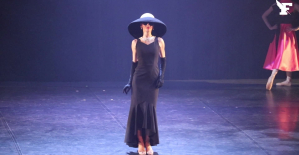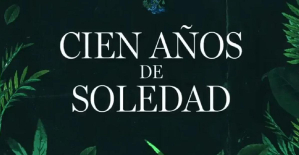The multi-line announcement directly in the title of Olga tokarczuk's novel "Jacob's books" promises to be "a great journey across seven borders, from various books drawn, and enriched by the Imagination, the greatest natural gift of the people". The cheeky presentation, as an old manuscript, the length of almost 1200 pages, the run is also backward: Belongs to tokarczuk's novel about the rather unpleasant Genre of post-modern picaresque novel?
Sure is: He leads in the mystical Tradition of Judaism, the Kabbalah. She was. the serious scholars of Judaism and the strict Talmudisten equally a Nuisance: irrgläubig, too close to the Christian Gnosis, or just bullshit about Numbers, letters, and secret patterns in sacred texts But this nonsense is also something like the secret river of Jewish history, and occurs always on the shore, when the Tradition needs to be renewed.
This is not to say that all self-appointed prophets and Messiahs of the Kabbalah were great innovators. Also Jacob Frank, the Hero of "Jacob books", is not "the Luther of the Jews", as the blurb claims. The label does both Frank as well as Luther wrong.
Jakob Frank (1726-1791). Photo:
Because deep traces of Frank and his movement, the left Frank of extremism, not in Judaism and not in Poland, where they learned the greatest ecstatic triumphs and most bitter defeats. As a substance, however, the life of the fur trader from Podolia is the key to several chapters of Central and Eastern European cultural and intellectual history.
The mystical Text reveals itself as a book of fairy tales
Olga tokarczuk's narrative runs slowly, Jacob Frank appeared only after 200 pages, and looks only in Poland-Lithuania around 1750, after flowering and before the division. The earth vibrates even after the agitated 17. Century, for Jews and non-Jews. The beklommene, but it is not only unfriendly exchange between these two groups is the theme of the novel.
He begins with an act of attempted cultural exchange: The priest Benedykt Chmielowski visited the town of Rohatyn, in order to replace with the Rabbi Elisha Schor books, his own work "Nowe Ateny" against the Zohar, the Central Text of the Kabbalah. Later, the Hebrew is not mighty father explains that he has to get instead of the Zohar, a book of fairy tales.
Not just because of his reaction – "what a child!" – hardly anti-Jewish overtones, is Chmielowski one of the heroes of the novel. He is, as Rabbi Schor, a historically documented Person, and Olga Tokarczuk makes him a slightly broken icon for a universally oriented Polish culture, met with the foreign Jews (and uneducated Poland) with paternalism, but also with interest and tolerance.
"The Jews are everywhere now"
His counter-image, which are also historically a politician Katarzyna Kossakowska, who complains early on that "the Jews are everywhere now, because you have to sit back and watch, they want to eat with skin and hair".
This world from the Polish nobility and the clergy is high-headed, but empty of blood, Tokarczuk, it outlines the change in the told passages and letter, in which, one of the few stylistic alienation effects, ss is always the sz is. The Chapter about the shtetl Jews, however, are from the first shock in a mystical tone of voice: The old Jenta, can not die, is the visionary of the novel, she sees the whole world and the next vibration.
The Ghost that haunts the of these prayer rooms and Yeshivot, means Schabbatai Zevi, the Pseudo-Messiah from Smyrna, whose movement drew from the Ottoman Empire to Eastern Europe and beyond Jews, even after his public conversion to Islam.
in Contrast, Jacob Frank is more of a small flame. His way is told through the eyes of Nahman of Busk, the love of prophets, and wise. Because many of the Jews of Eastern Europe so, can the charismatic Jacob Frank, a large entourage to the rally that he is convinced that he is the reincarnation of Schabbatai Between.
His Pronouncements are heretical, but flat. The basis of his charisma, miracles were deeds and, above all, ritual gatherings with song and dance, not without erotic implications.
more and more novels and films want to break the Silence about the displaced Jewish heritage.
The franking of the most disturb the balance between the Jews and the Christians. You biedern to different groups, be baptized, be locked up anyway, always have to flee again and settle at the end in the Hessian town of Offenbach. Olga Tokarczuk depicts this power struggle between the powerless Jews and the powerful Poland with great subtlety. They have freed their history of skulls, kitsch, and thus also of the connection to anti-Semitic myths.
The novel is also part of a specifically Polish memory project. The small Jewish community in Poland before the Shoah, the largest and liveliest in the world today, especially from outside of any awareness of Jewish Religion and culture, they grew up, often even baptized Jews. There were Jews, the end of the established Eighties, the Festival of Jewish culture in Krakow.
more and more novels and films want to break the Silence about the displaced Jewish heritage. Also, Olga Tokarczuk shows in her novel that Polish Jews were part of Poland, even if they spoke no Polish, not Catholic were, not even when Poland understood. She's doing this without a receipt, without Transfiguration, and only in the rarest cases ("Nachmans breath is like the dough of a challah") in the vicinity of the Kitsch.
Full of sorrow and tenderness
One is reminded of an anecdote of the famous Jewish scholar Gershom Scholem. One of Scholems lectures by way of introduction, explained the Rabbi Saul Lieberman, that he had forbidden his students to read Kabbalistic texts. A lecture by Scholem to these texts, however, was something quite different: "nonsense is nonsense. But the history of nonsense is science." And 1000 sensitive, tender, grief-filled pages of this nonsense is a great literature.
Olga Tokarczuk: The Jakob books. Roman. From the Polish by Lisa Palmes and Lothar Quinkenstein. Kampa, Zurich, 2019. 1184 p., approx. 55 Fr.
Created: 16.11.2019, 07:57 PM

 Germany: the trial of an AfD leader, accused of chanting a Nazi slogan, resumes this Tuesday
Germany: the trial of an AfD leader, accused of chanting a Nazi slogan, resumes this Tuesday New York: at Columbia University, the anti-Semitic drift of pro-Palestinian demonstrations
New York: at Columbia University, the anti-Semitic drift of pro-Palestinian demonstrations What is Akila, the mission in which the Charles de Gaulle is participating under NATO command?
What is Akila, the mission in which the Charles de Gaulle is participating under NATO command? Lawyer, banker, teacher: who are the 12 members of the jury in Donald Trump's trial?
Lawyer, banker, teacher: who are the 12 members of the jury in Donald Trump's trial? What High Blood Pressure Does to Your Body (And Why It Should Be Treated)
What High Blood Pressure Does to Your Body (And Why It Should Be Treated) Vaccination in France has progressed in 2023, rejoices Public Health France
Vaccination in France has progressed in 2023, rejoices Public Health France Food additives suspected of promoting cardiovascular diseases
Food additives suspected of promoting cardiovascular diseases “Even morphine doesn’t work”: Léane, 17, victim of the adverse effects of an antibiotic
“Even morphine doesn’t work”: Léane, 17, victim of the adverse effects of an antibiotic Orthodox bishop stabbed in Sydney: Elon Musk opposes Australian injunction to remove videos on X
Orthodox bishop stabbed in Sydney: Elon Musk opposes Australian injunction to remove videos on X One in three facial sunscreens does not protect enough, warns L'Ufc-Que Choisir
One in three facial sunscreens does not protect enough, warns L'Ufc-Que Choisir What will become of the 81 employees of Systovi, a French manufacturer of solar panels victim of “Chinese dumping”?
What will become of the 81 employees of Systovi, a French manufacturer of solar panels victim of “Chinese dumping”? “I could lose up to 5,000 euros per month”: influencers are alarmed by a possible ban on TikTok in the United States
“I could lose up to 5,000 euros per month”: influencers are alarmed by a possible ban on TikTok in the United States Dance, Audrey Hepburn’s secret dream
Dance, Audrey Hepburn’s secret dream The series adaptation of One Hundred Years of Solitude promises to be faithful to the novel by Gabriel Garcia Marquez
The series adaptation of One Hundred Years of Solitude promises to be faithful to the novel by Gabriel Garcia Marquez Racism in France: comedian Ahmed Sylla apologizes for “having minimized this problem”
Racism in France: comedian Ahmed Sylla apologizes for “having minimized this problem” Mohammad Rasoulof and Michel Hazanavicius in competition at the Cannes Film Festival
Mohammad Rasoulof and Michel Hazanavicius in competition at the Cannes Film Festival Skoda Kodiaq 2024: a 'beast' plug-in hybrid SUV
Skoda Kodiaq 2024: a 'beast' plug-in hybrid SUV Tesla launches a new Model Y with 600 km of autonomy at a "more accessible price"
Tesla launches a new Model Y with 600 km of autonomy at a "more accessible price" The 10 best-selling cars in March 2024 in Spain: sales fall due to Easter
The 10 best-selling cars in March 2024 in Spain: sales fall due to Easter A private jet company buys more than 100 flying cars
A private jet company buys more than 100 flying cars This is how housing prices have changed in Spain in the last decade
This is how housing prices have changed in Spain in the last decade The home mortgage firm drops 10% in January and interest soars to 3.46%
The home mortgage firm drops 10% in January and interest soars to 3.46% The jewel of the Rocío de Nagüeles urbanization: a dream villa in Marbella
The jewel of the Rocío de Nagüeles urbanization: a dream villa in Marbella Rental prices grow by 7.3% in February: where does it go up and where does it go down?
Rental prices grow by 7.3% in February: where does it go up and where does it go down? Europeans: “All those who claim that we don’t need Europe are liars”, criticizes Bayrou
Europeans: “All those who claim that we don’t need Europe are liars”, criticizes Bayrou With the promise of a “real burst of authority”, Gabriel Attal provokes the ire of the opposition
With the promise of a “real burst of authority”, Gabriel Attal provokes the ire of the opposition Europeans: the schedule of debates to follow between now and June 9
Europeans: the schedule of debates to follow between now and June 9 Europeans: “In France, there is a left and there is a right,” assures Bellamy
Europeans: “In France, there is a left and there is a right,” assures Bellamy These French cities that will boycott the World Cup in Qatar
These French cities that will boycott the World Cup in Qatar Serie A: Bologna surprises AS Rome in the race for the C1
Serie A: Bologna surprises AS Rome in the race for the C1 Serie A: Marcus Thuram king of Italy, end of the debate for the position of number 9 with the Blues?
Serie A: Marcus Thuram king of Italy, end of the debate for the position of number 9 with the Blues? Milan AC-Inter Milan: Thuram and Pavard impeccable, Hernandez helpless… The tops and flops of the derby
Milan AC-Inter Milan: Thuram and Pavard impeccable, Hernandez helpless… The tops and flops of the derby Ligue 2: Auxerre leader, Bordeaux in crisis, play-offs... 5 questions about an exciting end of the season
Ligue 2: Auxerre leader, Bordeaux in crisis, play-offs... 5 questions about an exciting end of the season


















